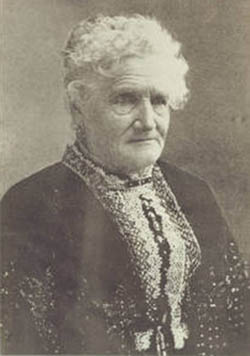Esther Hobart Morris (Esther Hobart Morris)

Esther Hobart Morris (August 8, 1814 – April 3, 1902) was the first woman justice of the peace in the United States. A mother of three boys, she began her tenure as justice in South Pass City, Wyoming, on February 14, 1870, serving a term of less than nine months. The Sweetwater County Board of County Commissioners appointed Morris as justice of the peace after the previous justice, R. S. Barr, resigned in protest of Wyoming Territory’s passage of the women’s suffrage amendment in December 1869. Popular stories and historical accounts, buttressed by state and federal public monuments, point to Morris as a leader in the passage of Wyoming’s suffrage amendment. However, Morris’ leadership role in the legislation is disputed. It is clear, however, that she had strongly encouraged and influenced South Pass City saloon owner William H. Bright, then a representative to the Wyoming Territorial Constitutional Convention, to introduce in 1869 a women’s suffrage clause into the territorial constitution. When the constitution was approved by territorial Governor John A. Campbell in December 1869, Wyoming became the first jurisdiction in the United States to grant women the right to vote, a right which was not granted women nationally until 1920. Esther Hobart Morris died in Cheyenne on April 3, 1902, at age 87 (or 90). She is interred at Lakeview Cemetery in Cheyenne, where a simple stone monument adorned only with her name marks her grave site. Since 1960, a statue of her sculpted by Avard Fairbanks has been one of Wyoming’s two statutes in the National Statuary Hall Collection in the United States Capitol. Another statute stands at the Wyoming State Capitol.
Born
- August, 08, 1814
- USA
- Tioga County, New York
Died
- April, 02, 1902
- USA
- Cheyenne, Wyoming
Cemetery
- Lakeview Cemetery
- Cheyenne, Wyoming
- USA



